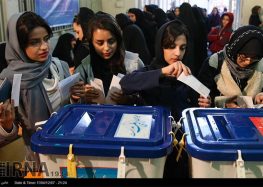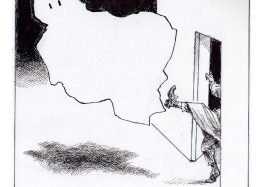Election Process: Analysis and Updates
Iran’s Election Laws vs. International Standards
————————————
On March 14, 2008, Iran holds nationwide parliamentary elections for 290 seats in the national assembly known as the Majlis. As in previous presidential and parliamentary elections, the process of vetting candidates fails even minimally to comply with international standards for free and fair elections. Indeed, in excluding for transparently political reasons a vast number of candidates from appearing on the ballot on March 14, the Iranian government’s manipulation of the upcoming elections appears to be even more systematic and arbitrary than in the past. Iranian elections are generally tightly controlled by the authorities through a vetting process that allows only candidates who have “proven” their loyalty to the state as members of the ruling elite. They are commonly referred to as “insiders” [khodi]. In contrast, opposition candidates and independents, known as “outsiders,” [gheir-khodi] are barred from the election process by the authorities, that is, discriminated against following a vetting procedure based on regime loyalty and religious adherence as determined by election authorities.
During the past decade, the distinction between “insiders” and “outsiders” has dramatically sharpened, as admission to the “insiders” circle has become increasingly exclusionary and discriminatory. The vetting process for the upcoming elections has disqualified large numbers of candidates who previously held official positions and were regarded as “insiders”.
On January 24, 2008, the Interior Ministry, charged with the first phase of vetting candidates, announced the disqualification of a third of the candidates registered for the upcoming elections. The disqualified candidates include sitting parliamentarians as well as former cabinet ministers, mayors and governors. They belong predominantly to the reformist faction close to former president Mohammad Khatami. The Interior Ministry gave the reason for many of these disqualifications as “lack of practical belief in the Islamic faith and the sacred order [nizam-e moghadas] of the Islamic Republic of Iran.” The accusation leveled against prospective candidates as lacking practical belief in the Islamic faith amounts to a modern inquisition.
By all indications, the election process is being manipulated by the authorities to ensure that only candidates who are sympathetic to the hard-line faction known as “the principalists” [usulgara] would compete in vast majority of districts. The political composition of the parliament is thus being decided ahead of the elections, making them even more unfair and undemocratic than previous elections.
Furthermore, in an unprecedented development, military commanders are taking political positions by expressing their strong support for “the principalist” faction. On February 8, 2008, Mohammad Ali Jaafari, the commander of the Revolutionary Guards in a public speech in Tehran University said, “Supporting the principalists faction is a definite necessity, is inevitable, and is the divine responsibility of revolutionary forces in the country.” [1] Political posturing by the armed forces threatens to induce an atmosphere of fear and intimidation over the elections.
Iran’s election process is in serious violation of its international obligations and commitments.
Independent Iranian human rights defenders have expressed grave concerns regarding the manner in which the state authorities continue to violate the right of Iranian citizens to participate in free and fair elections. A group of twenty-three independent Iranian lawyers, academics, and political personalities announced the formation of the Committee for Free and Fair Elections on October 8, 2007. [2]
The Committee undertook to monitor and evaluate the upcoming elections according to international standards and covenants that Iran has signed and ratified, including the Universal Declaration of Human Rights, the International Covenant on Civil and Political Rights (ICCPR), and the Criteria for Free and Fair Elections adopted by the Inter-Parliamentary Union. [3]
In a statement issued on January 20, 2008, analyzing the Iranian election laws within the framework of international standards for free and fair elections, the Committee declared that Iran’s election laws are in contradiction with these standards. The statement further pointed out that in addition to the shortcomings of the election laws, the arbitrary interference of the Guardian Council, (the main body charged with overseeing the elections, as discussed in the next section), is the main obstacle to democratic and free elections that would guarantee the rights of citizens from all political persuasions. [4]
The Committee believes the Iranian Parliament should reform the election law according to international standards, not only to allow various political factions within the ruling elite to compete, but to guarantee the rights of every citizen, including members of genuine political opposition parties and independent figures, to participate in the election process. Only then could Iran’s elections be considered to be in accordance with a minimal set of internationally accepted norms for free, fair, and democratic elections.
———————————
Iran’s Election Laws vs. International Standards
Iranian elections are conducted through a two stage process. In the first stage, the authorities, namely the Interior Ministry and the Guardian Council (GC), determine which of the registered candidates qualify to be placed on the ballot. The second stage is the actual voting process, in which voters choose from among the approved candidates. The Guardian Council is composed of twelve religious jurists, six of whom are clerics appointed by the Supreme Leader and the remaining six members are legal experts nominated by the Judiciary and confirmed by the Parliament. The GC is not accountable to any authority other than the Supreme leader. Any appeals challenging its decisions must be filed with the GC itself, demonstrating a complete absence of any system of check and balances consistent with basic Rule of Law principles, and allowing for the arbitrary nature of the GC’s decision- making process.
The election laws prescribe the process of vetting registered candidates in two phases. After an aspiring candidate registers with the election committee at the Interior Ministry, this committee is charged with verifying that the candidate fulfills a set of criteria stipulated by the election law. A number of criteria in the election laws are vague and arbitrary in their formulation. Items 1, 3, and 5 of Articles 28 of the Parliamentary Election Law respectively stipulate that each candidate must fulfill the following criteria: [5]
- Practical belief in the Islamic faith and the sacred order [nizam-e moghadas] of the Islamic Republic of Iran.
- Declaration of loyalty to the progressive principle of the absolute rule of the Jurisconsult [velayat-e motlaqeh faqih] and the Constitution.
- Absence of ill repute in the election district.
The law is moot on the methods by which the fulfillment of these criteria is to be documented and determined. The election authorities at the Interior Ministry are charged with investigating each candidate and to announce its findings to the Guardian Council. The Interior Ministry commences the investigations along with four other official organs: the Intelligence Ministry, the Public Prosecutor, the Bureau of Registry (Sazeman-e Sabt-e Ahval), the Bureau of Identity Verification (Edareh Tashkis Hoviat), and the International Police.
In practice, Interior Ministry officials announce their decision without providing any documentation to justify how they arrived at their judgment. The majority of candidates who are disqualified are charged with not fulfilling the criteria listed above, but without any supporting evidence.
During the second phase of the qualification process, the GC reviews the findings of the Interior Ministry and has unconditional authority to accept or reject them. But whereas the Interior Ministry relies on the criteria stipulated by the election law, however vague they may be, the GC enjoys completely arbitrary powers according to the process known as known as “approbatory supervision” [nezarat-e estesvabi]. Relying on Article 3 of the Parliamentary Election Law, the GC thus exerts an unlimited degree of interference in the election process. This article states that:
The Guardian Council has the responsibility of supervision of the parliamentary elections. This supervision is approbatory, general, and applicable to every phase of all matters related to the elections. [6]
The GC interprets this article as giving it ultimate authority in deciding who may compete in the elections, without being obligated to provide any justification for its decisions. Coupled with the intrusive and vague criteria set forth in Article 28 of the law, the GC is empowered subjectively to judge the beliefs and creed of aspiring candidates. It has increasingly wielded this power to shape the political landscape in presidential and parliamentary elections.
The upcoming parliamentary elections are being heavily affected by the GC’s arrogation of power and the arbitrary and exclusionary process by which many candidates, who have already held high office within the Islamic Republic, are disqualified simply because their political beliefs are not completely consistent with those espoused by the GC and the election officials in President Ahmadinejad’s Interior Ministry. Under such circumstances, it is evident that political opposition and independent candidates do not stand a chance in competing in Iran’s elections, and having recognized this, they have not even registered their candidacy.
Such elections egregiously violate international standards for democratic, free, and fair elections.
Iran is a party to the Covenant for Civil and Political Rights (ICCPR). The Covenant requires Iran to provide equal opportunity to its citizens to participate in the election process as candidates. Article 25 of ICCPR states that “every citizen shall have the right and the opportunity, without any of the distinctions mentioned in article 2 and without unreasonable restrictions to vote and to be elected at genuine periodic elections which shall be by universal and equal suffrage and shall be held by secret ballot, guaranteeing the free expression of the will of the electors.” [7] Iran’s election laws and procedure constitute a set of “unreasonable restrictions” that deprive any citizen who does not espouse certain political beliefs or an officially sanctioned version of the Islamic belief—according to a subjective and totally non-transparent religious test– from participating as a candidate in the elections.
As a member of the Inter-Parliamentary Union, Iran also signed the Declaration of Criteria for Free and Fair Elections in 1994, committing to respecting and instituting these Criteria. The Iranian election law and practices directly violate the key articles of this Declaration with regard to every citizen’s right to register as a candidate.
Article 2.3 of the Declaration states that: “No eligible citizen shall be denied the right to vote or disqualified from registration as a voter, otherwise than in accordance with objectively verifiable criteria prescribed by law, and provided that such measures are consistent with the State’s obligations under international law.” [8] Article 3.2 recognizes the right of every citizen “to join, or together with others to establish, a political party or organization for the purpose of competing in an election.” The Declaration explicitly forbids election laws to “be applied so as to violate the principle of non-discrimination on grounds of race, color, sex, language, religion, political or other opinion, national or social origin, property, birth or other status.” [9]
Iran’s election laws, as well the GC’ arbitrary application of “approbatory supervision”, are in direct violation of the above standards. Particularly, article 28.1 and 28.3 of the Parliamentary Election Law requires investigation into and judgment of the candidates’ political and religious beliefs.
First Stage of Disqualification
A total of 7,597 aspiring candidates registered their candidacy with the election officials of the Interior Ministry. On January 24, 2008, the election committee of the Interior Ministry officially announced the results of the first phase of vetting candidates. According to this statement, more than two thousands candidates or 31% of those registered were disqualified throughout the country. [10]
The statistics provided by the Interior Ministry demonstrates that only a minority of the disqualified candidates were disqualified due to documented reasons and not based on an arbitrary judgment of election officials:
- 69 persons did not resign from their government post by the due date,
- 131 persons have court judgments against them,
- 188 persons did not qualify based on lack of higher educational degree.
The Interior Ministry also announced that 329 persons were disqualified due to “ill reputations in their place of residency.” It did not specify on what criteria “ill reputation” is defined or demonstrated.
In its announcement, the Interior Ministry said that the reasons for disqualification of the other approximately 1,600 candidates are: addiction or trafficking of narcotics, convictions to Islamic punishments, connections with the previous regime, acting against the Islamic Republic, lack of practical belief in the Islamic faith and the order of the Islamic republic, membership or sympathy in separatist and terrorist groups, connections with foreign intelligence services, insulting sacred religious beliefs, the prophet, and his family, rioting in the country, and sympathy with deviant religious sects.
Three main reformist parties whose candidates were disqualified en mass, Iran Participation Front, Organization of the Islamic Revolution’s Mujahedin, and National Confidence Party [Hizb Etemad Melli] have charged that their candidates were disqualified due to political prejudice by the Ahmadinejad’s government to eliminate its rivals by relying on the vague criteria of article 28 of the election laws. According to these reformist parties, their candidates received a letter from the Interior Ministry that stated:
“…hereby you are notified that in the qualification process of those volunteering to become members of the Eighth parliament, and based on items 1,3, and 5 of article 28 of the election law, your competence has not been obtained…” [11]
In effect, the Interior Ministry decided that these candidates have ceased to have practical belief in the Islamic faith.
Second Stage of Disqualification
The Interior Ministry submitted the results of its vetting process to the GC for its final decision on January 24, 2008. For the next month, the political class within Iran engaged in intense behind the doors negotiations between various leading figures and the GC to influence the vetting process. The reformers close to the former president, Mohammad Khatami, hoped to reverse the results of the Interior Ministry’s disqualifications. As the government never formally announced the complete list of disqualified candidates during the first stage, it was not clear what changes took place between the first and second stage of disqualifications. However, the initial disqualification news of certain well-known candidates such as Ali Eshraghi, grandson of Ayatollah Khomeini, caused enough outrage that the GC reinstated his qualification.
By the end of the non-transparent political negotiations, the GC announced the final number of qualified candidates. On February 23, 2008, Abbas-ali Kadkhodaii, the GC’s spokesperson told a news conference that more than 2,200 candidates or 31% of aspiring candidates have been disqualified. [12] Therefore, the number of disqualified candidates did not change between the first and second stage of the vetting process. Although certain individuals may have been reinstated by the GC, others who had been qualified during the first stage must have been disqualified in the second stage. Neither the Interior Ministry nor the GC provided names of disqualified candidates.
According to the reformist political parties, the final result of the vetting process targeted their candidates to such an extent that they do not have any qualified candidates to compete in the vast majority of districts. The Reformist Coalition issued a statement on February 24, saying that it lacks any candidates to compete for as many as two-thirds of seats in the Parliament due to the disqualification process. [13] The other major reformist party, National Confidence Party [Hizb Etemad Melli], also said that its candidates, who survived the vetting process, can compete only for 55% of the seats. [14]
[1] “Political speech of the Guards Commander,” Norooz News, http://norooznews.ir/news/5761.php
[2] Statement on Establishment of Committee for Free and Fair Elections, October 8, 2007
[3] DECLARATION ON CRITERIA FOR FREE AND FAIR ELECTIONS, Unanimously adopted by the Inter-Parliamentary Council at its 154th session, Paris, March, 26, 1994, http://www.ipu.org/cnl-e/154-free.htm
[4] http://news.gooya.com/politics/archives/2008/01/067179.php
[5] Parliamentary Election Law, Available at the Interior Ministry website: www.moi.ir
[6] Ibid.
[7] International Covenant on Civil and Political Rights, G.A. res. 2200A (XXI), 21 U.N. GAOR Supp. (No. 16) at
52, U.N. Doc. A/6316 (1966), 999 U.N.T.S. 171, signed by Iran on April 4, 1968 and ratified on June 24, 1975.
[8] DECLARATION ON CRITERIA FOR FREE AND FAIR ELECTIONS, Unanimously adopted by the Inter-Parliamentary Council at its 154th session, Paris, March, 26, 1994, http://www.ipu.org/cnl-e/154-free.htm
[9] Ibid.
[10] “Announcement #10 by the election staff of the Interior Ministry,” Iranian Students News Agency, January 24, 2008, www.isna.ir/Main/NewsView.aspx?ID=News-1074228
[11] “You are disqualified based on articles 1, 3, and 5!,”Norooz News, January 23, 2008, http://norooznews.ir/news/5444.php
[12] “Guardian Council’s spokesman says political views not a concern for disqualifications,” Iranian Students News Agency, February 23, 2008, http://www.isna.ir/Main/NewsView.aspx?ID=News-1091942
[13] “Statement #3 of the Reformist Coalition,” February 24, 2008, http://norooznews.ir/news/6027.php
[14] “We have the possibility to compete for 55% of seats,” Iranian Students News Agency, February 24, 2008.



